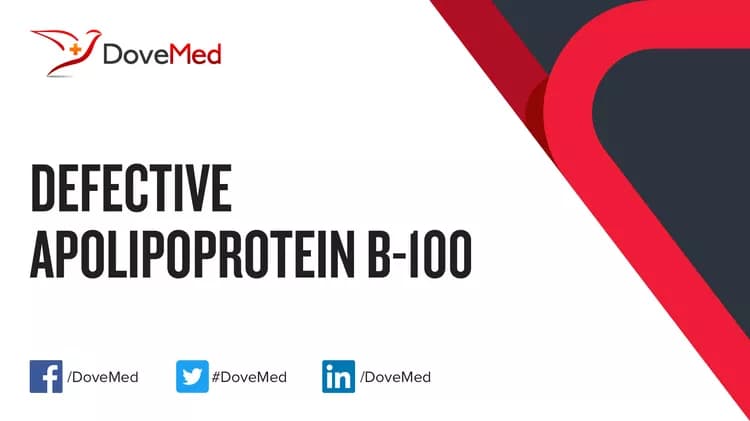What are the other Names for this Condition? (Also known as/Synonyms)
- Apolipoprotein B-100, Familial Defective type
- Familial Defective Apolipoprotein B-100(FDB)
- Familial Hypercholesterolemia, due to Ligand-Defective Apolipoprotein B
What is Defective Apolipoprotein B-100? (Definition/Background Information)
- Defective Apolipoprotein B-100 is characterized by high cholesterol in blood, due to a mutation in APOB gene
- This mutation prevents the low density lipoproteins (LDL) from binding to their receptors in cells
- The condition is inherited in an autosomal dominant manner. Both genders may get affected by Defective Apolipoprotein B-100
- The circulating LDL can get deposited in skin, tendons and arteries, leading to complications including heart attack
Who gets Defective Apolipoprotein B-100? (Age and Sex Distribution)
- Defective Apolipoprotein B-100 is a rare congenital disorder, contributing to hypercholesterolemia cases in many countries
- Both males and females are susceptible to the disorder
- Worldwide, individuals of all racial and ethnic groups may be affected
What are the Risk Factors for Defective Apolipoprotein B-100? (Predisposing Factors)
The risk factors for Defective Apolipoprotein B-100 may include:
- A positive family history may be an important risk factor, since the disorder can be inherited
- Unhealthy eating habits, consuming foods high in fat
- Sedentary lifestyle
- Smoking habit
It is important to note that having a risk factor does not mean that one will get the condition. A risk factor increases one’s chances of getting a condition compared to an individual without the risk factors. Some risk factors are more important than others.
Also, not having a risk factor does not mean that an individual will not get the condition. It is always important to discuss the effect of risk factors with your healthcare provider.
What are the Causes of Defective Apolipoprotein B-100? (Etiology)
- Defective Apolipoprotein B-100 is caused by mutation(s) in the APOB gene
- The resultant mutant Apolipoprotein B-100 does not allow LDL cholesterol to bind its receptors, causing them to circulate in blood
- Defective Apolipoprotein B-100 mutation(s) are inherited in an autosomal dominant manner
Autosomal dominant: Autosomal dominant conditions are traits or disorders that are present when only one copy of the mutation is inherited on a non-sex chromosome. In these types of conditions, the individual has one normal copy and one mutant copy of the gene. The abnormal gene dominates, masking the effects of the correctly function gene. If an individual has an autosomal dominant condition, the chance of passing the abnormal gene on to their offspring is 50%. Children, who do not inherit the abnormal gene, will not develop the condition or pass it on to their offspring
What are the Signs and Symptoms of Defective Apolipoprotein B-100?
The signs and symptoms of Defective Apolipoprotein B-100 may include:
- High blood LDL cholesterol levels
- Plaque formation in arterial walls
- Chest pain (angina)
- LDL deposits in tendons (Achilles tendons, and those of hands and fingers) known as Xanthoma
- Accumulation of cholesterol under the skin
- Accumulation of LDL in the eyelids and cornea
How is Defective Apolipoprotein B-100 Diagnosed?
Defective Apolipoprotein B-100 is diagnosed on the basis of the following information:
- Complete physical examination
- Thorough medical history evaluation
- Assessment of signs and symptoms
- Laboratory tests
- Imaging studies
- Biopsy studies, if necessary
Many clinical conditions may have similar signs and symptoms. Your healthcare provider may perform additional tests to rule out other clinical conditions to arrive at a definitive diagnosis
What are the possible Complications of Defective Apolipoprotein B-100?
The complications of Defective Apolipoprotein B-100 may include:
- Progressive eye clouding due to corneal cholesterol deposits, causing vision impairment
- Heart attack
Complications may occur with or without treatment, and in some cases, due to treatment also.
How is Defective Apolipoprotein B-100 Treated?
There is no cure for Defective Apolipoprotein B-100, since it is a genetic condition. The following treatments may be provided for high cholesterol:
- Medications containing statins
- Drugs that inhibit cholesterol absorption by the intestines
- Medications that allow the liver to absorb excess cholesterol
How can Defective Apolipoprotein B-100 be Prevented?
Defective Apolipoprotein B-100 may not be preventable, since it is a genetic disorder.
- Certain lifestyle changes such as a healthy diet, smoking cessation and moderate exercise may help minimize risks of high cholesterol in blood
- Genetic testing of the expecting parents (and related family members) and prenatal diagnosis (molecular testing of the fetus during pregnancy) may help in understanding the risks better during pregnancy
- If there is a family history of the condition, then genetic counseling will help assess risks, before planning for a child
- Active research is currently being performed to explore the possibilities for treatment and prevention of inherited and acquired genetic disorders
Regular medical screening at periodic intervals with tests and physical examinations are recommended.
What is the Prognosis of Defective Apolipoprotein B-100? (Outcomes/Resolutions)
- The prognosis of Defective Apolipoprotein B-100 is dependent upon the severity of the signs and symptoms and associated complications, if any
- Individuals with mild conditions have better prognosis than those with severe symptoms and complications
- Typically, the prognosis may be assessed on a case-by-case basis
Additional and Relevant Useful Information for Defective Apolipoprotein B-100:
The following DoveMed website link is a useful resource for additional information:
Related Articles
Test Your Knowledge
Asked by users
Related Centers
Related Specialties
Related Physicians
Related Procedures
Related Resources
Join DoveHubs
and connect with fellow professionals


0 Comments
Please log in to post a comment.